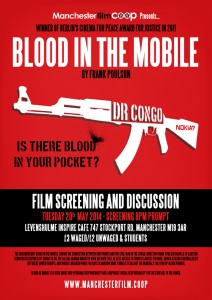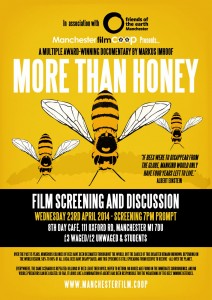20 May – Blood In The Mobile
Manchester Film Co-op would like to invite you to our screening of ‘Blood In The Mobile’ by Frank Poulsen, Winner of Berlin’s Cinema for Peace Award for Justice in 2011.
 The documentary Blood in the Mobile shows the connection between our phones and the civil war in the Congo. Director Frank Poulsen travels to Eastern Democratic Republic of Congo to see the illegal mining industry with his own eyes. He gets access to Congo’s largest tin-mine, which is being controlled by different armed groups, and where children work for days in narrow mine tunnels to dig out the minerals that end up in our phones.
The documentary Blood in the Mobile shows the connection between our phones and the civil war in the Congo. Director Frank Poulsen travels to Eastern Democratic Republic of Congo to see the illegal mining industry with his own eyes. He gets access to Congo’s largest tin-mine, which is being controlled by different armed groups, and where children work for days in narrow mine tunnels to dig out the minerals that end up in our phones.
Most of the minerals used to produce cell phones are coming from the mines in DR Congo. The Western World is buying these “conflict minerals” and thereby financing a civil war that, according to human rights organisations, has been the bloodiest conflict since World War II. During the last 15 years the conflict has cost the lives of more than 5 million people and 300.000 women have been raped. The war will continue as long as armed groups can finance their warfare by selling minerals. Blood in Mobile is a film about our personal responsibility and corporate social responsibility for the conflict in the Congo.
Time: Screening to begin at 8pm prompt.
Admission: £3 waged, £2 unwaged/student.
Venue: Levenshulme Inspire Cafe, 747 Stockport Rd, Manchester, M19 3AR
Optional RSVP: Facebook.



 Manchester Film Co-operative would like to invite you to a screening of the Oscar-nominated documentary film, Dirty Wars.
Manchester Film Co-operative would like to invite you to a screening of the Oscar-nominated documentary film, Dirty Wars.